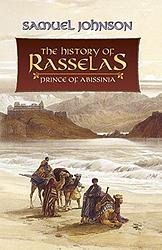The History of Rasselas, Prince of Abissinia by Samuel Johnson, Abraham Raimbach, Robert Smirke
This book explores the philosophical journey of an Ethiopian prince, Rasselas, who escapes his luxurious palace to experience the world and understand the true nature of life. Throughout his travels, he encounters a wide array of people and their ways of life, from hermits to poets, and from scholars to merchants. Each encounter provides him with a different perspective on life, happiness, and the human condition. Despite his many experiences, Rasselas is left with more questions than answers, reflecting the complexity and ambiguity of life.
The 1121st greatest book of all time
- Published
- 1759
- Nationality
- British
- Type
- Fiction
- Pages
- Unknown
- Words
- 35,000
- Original Language
- English
If you're interested in seeing the ranking details on this book go here
This book is on the following lists:
- 182nd on Our Users' Favorite Books of All Time (The Greatest Books Users)
- 1001 Books You Must Read Before You Die (The Book)
- 1000 Novels Everyone Must Read (The Guardian)

